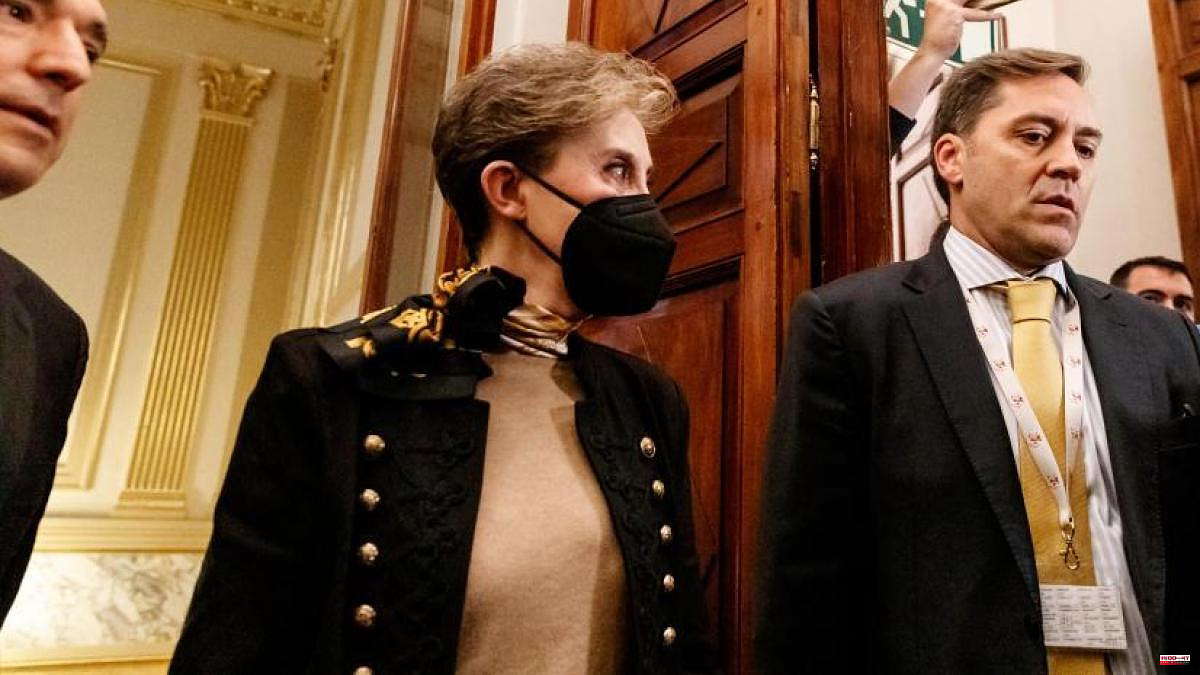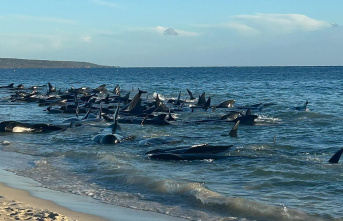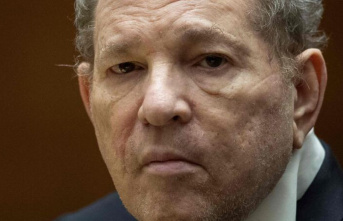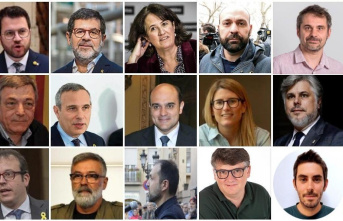Antennas in ERC, in Junts, in the CUP, in the PDECat, two in the Catalan National Assembly (ANC) and Òmnium Cultural, a few near Carles Puigdemont and many others in those who could supposedly have a relationship with the Defense Committees of the Republic (CDR) or with Tsunami Democràtic. The 18 people for whose espionage the National Intelligence Center (CNI) requested – and obtained – judicial authorization outline a complete map of the independence movement in the period 2019-2020, according to the complete list of people intervened that the director of the entity, Paz Esteban, took the Official Secrets Commission last week, which La Vanguardia has agreed to.
The 18 spies are Pere Aragonès, then vice-president of the Generalitat and national coordinator of ERC; Jordi Sànchez, general secretary of Junts per Catalunya; Carles Riera, CUP deputy; Elisenda Paluzie, president of the ANC; Marcel Mauri, vice president of Omnium; Jordi Bosch de Borja, member of the board of Òmnium; Gonzalo Boye, lawyer for Carles Puigdemont; Joan Matamala, a friend of the former president; Josep Lluís Alay, head of the Waterloo Office; Xavier Vendrell, businessman and former ERC councilor; Elsa Artadi, vice president and leader of Junts in Barcelona; Albert Batet, Member of Parliament for Junts; David Bonvehí, president of the PDECat; Marc Solsona, Deputy Secretary General of PDECat and Mayor of Mollerussa; Sergi Miquel Gutiérrez, director of the technical structure of the Casa de la República; and Jordi Baylina, Pau Escrich and Xavier Vives, technology entrepreneurs.
These 18 interventions are the only ones for which the CNI is responsible for the list of 65 people attacked or infected with Pegasus or Candiru revealed by Citizen Lab, an organization attached to the University of Toronto that on April 18 published a report in which denounced a massive espionage to the Catalan independence movement. In this way, there are 47 espionages (or attempts) that have not been attributed to any police or intelligence service. Esteban also ruled out that the center had anything to do with the Pegasus attacks on the cell phones of Pedro Sánchez and three ministers.
The list of 18 was requested by the CNI from the magistrate of the Supreme Court Pablo Lucas, who protects their actions and who approved them. Elies Campo, the computer engineer who has worked with Citizen Lab in the investigation and who does appear, instead, in the group of 65, is not in it.
In reality, the CNI went further, because its director, Paz Esteban, only presented to the Official Secrets Commission the judicial authorizations referring to people who appeared on the list of 65. Moreover, in the documents provided there appeared seven or eight names crossed out, corresponding to as many other people on whom the espionage was authorized and who escaped analysis by Citizen Lab. The CNI thus prevented hitherto unknown names from leaking out.
Four or five of the deleted names are part of the technological environment that the CNI links to Tsunami Democràtic, a couple more were in the car on the ANC and another in one referring to the environment of Junts per Catalunya.
Esteban pointed out that four of the 18 interventions were unsuccessful, that is, the CNI was unable to infect the targets.
The now former director of the body maintained during her appearance that, like jihadism, the Catalan independence movement poses a threat to the integrity of the State. Esteban read the Intelligence Directive, approved by the Government of Sánchez in 2019, in which the “independence campaigns” are cited as one of the objectives of the CNI. Also the protection of the international image of Spain.
The damage to national prestige is one of the arguments that are repeated in the authorizations for the 18 interventions. Another concern is movements such as Tsunami Democràtic or the CDR, to which the CNI describes as structured and hierarchical organizations and attributes an important capacity for mobilization. One of the court documents cites an alleged organization called Eskamots (with a k), possibly referring to the so-called "escamots de foc" mentioned on some websites as radical splits from Tsunami.
The CNI tries in its investigation to weave the network of relations of the different sensitivities of the independence movement, from the CUP to Junts. And above all: anyone who has contacts with Carles Puigdemont is interested.
Some of those spied on are grouped by their militancy, and each petition offers different arguments. The judge authorizes the intervention, but without specifying the use of Pegasus or similar software, much more intrusive than a simple phone tap. La Vanguardia has been able to partially rebuild some cars.
The authorization for Aragonès is based on the alleged role granted by the CNI as "coordinator" of the CDR, which mobilized to protest against the sentence of the procés, of October 14, 2019. On November 13, in a radio interview , the then vice president called for popular mobilization: "We cannot loosen up."
The authorizations are valid for three months, and the Citizen Lab analysis has evidence that Aragonès' cell phone was attacked with Pegasus on January 4, 5 and 13; Pedro Sánchez was invested as president on January 7, with the support of ERC. That is to say, the punctures entered within the legal term, although at that time the CDRs did not appear in the headlines as much as the agreement between ERC and PSOE.
Carles Riera, a deputy for the CUP in Parliament, who has also maintained contacts in Waterloo with Puigdemont, is also linked to the CDR.
Because many of the secret service requests are built around the former president, who has fled to Belgium since October 2017. Elsa Artadi's, for example. She is described as "liaison" with him. Artadi has been Junts' potential candidate for mayor of Barcelona in recent months, but on the 7th she announced that she was leaving politics for personal reasons.
The lawyer of former president Gonzalo Boye was also spied on by the CNI. The CNI recalls in its argument that the Chilean lawyer was sentenced in 1996 for collaborating with ETA in the kidnapping of businessman Emiliano Revilla. Boye, the only lawyer on the CNI's list (there are two others on Citizen Lab's list), is the one on which the CNI requests the most extensions. The Supreme grants them.
The two members of the PDECat intervened by the CNI have also been so because of their proximity to Waterloo, and in a literal sense: David Bonvehí, president of the party, has visited him frequently, as has Marc Solsona, mayor of Mollerussa and assistant general secretary of the PDECat, who was one of those responsible for the negotiation to separate the paths of this party and Junts.
Jordi Bosch, a member of Òmnium Cultural and with a rich network of contacts with left-wing formations, such as the ERC, the CUP or the commons, and with the nearby ANC, stands out in this map of relations, and that draws the attention of Spanish intelligence.
The businessman and former ERC Minister Xavier Vendrell has a double interest for the CNI. On the one hand, he plays a role as a link between Brussels and the republican formation and, on the other, he is accused in a summary in which the financial support of the Belgian exile is investigated. Also charged in this case is Josep Lluís Alay, a Puigdemont stalwart who is linked to the alleged secessionist attempt to gain political, financial and even military support from Putin's Russia. Russia is one of the reasons for the CNI to puncture Alay.
Along these lines, Paz Esteban suggested several times in the Official Secrets Commission that Russia, with its interest in the destabilization that the procés could cause in Europe, could be behind the 47 espionage detected by Citizen Lab and not assumed by the CNI. He also cited the kingdom of Morocco on several occasions.
Some of those investigated are technology experts. The CNI assumes that they are responsible for Tsunami Democràtic, the movement that after the sentence of the procés called for various mobilizations in Catalonia, several of which ended with serious incidents. Some of the records suggest a violence close to terrorism in the acts of Tsunami.
It is also argued that there are experts in cryptocurrencies and electronic voting systems in this area. The CNI grants the so-called "digital republic" enormous importance.
"Yes, we have it". Esteban admitted before the commission that the punctures were made with Pegasus, developed by the Israeli company NSO Group and also used by other state agencies, as he also suggested during the session. He insisted, trying to undermine the credit of Citizen Lab, that traces of Pegasus can be created artificially and questioned the participation in the investigation of Elies Campo, whose pro-independence sympathies he recalled. The Canadian center assures that not one of its analyzes has been denied in ten years.
4












